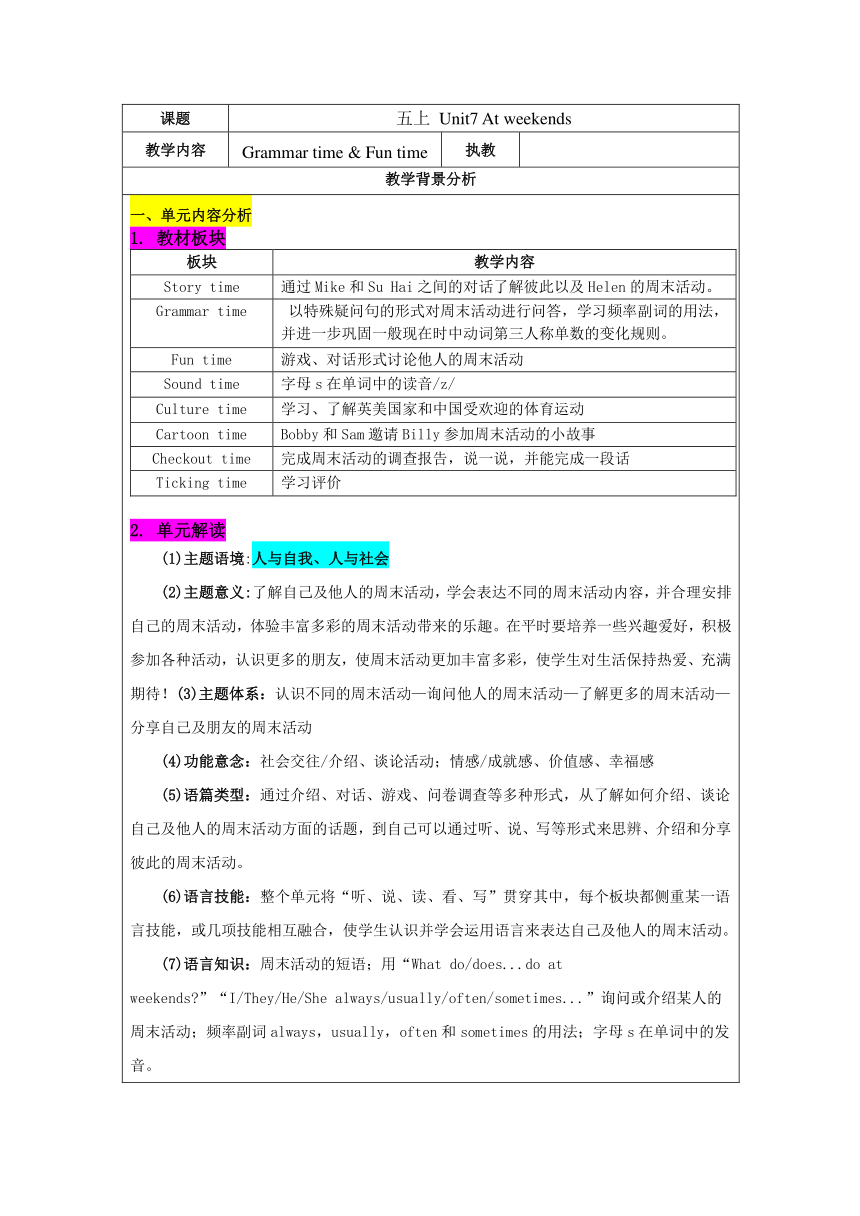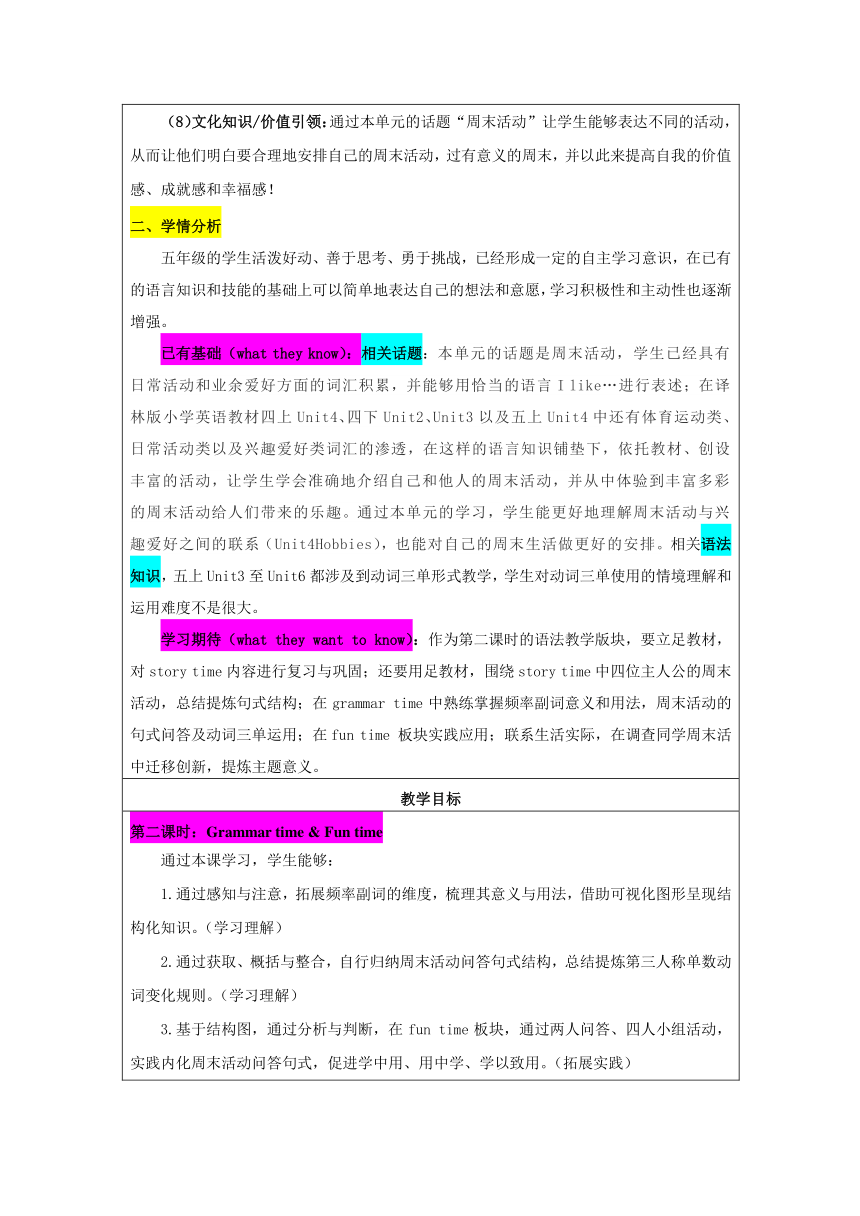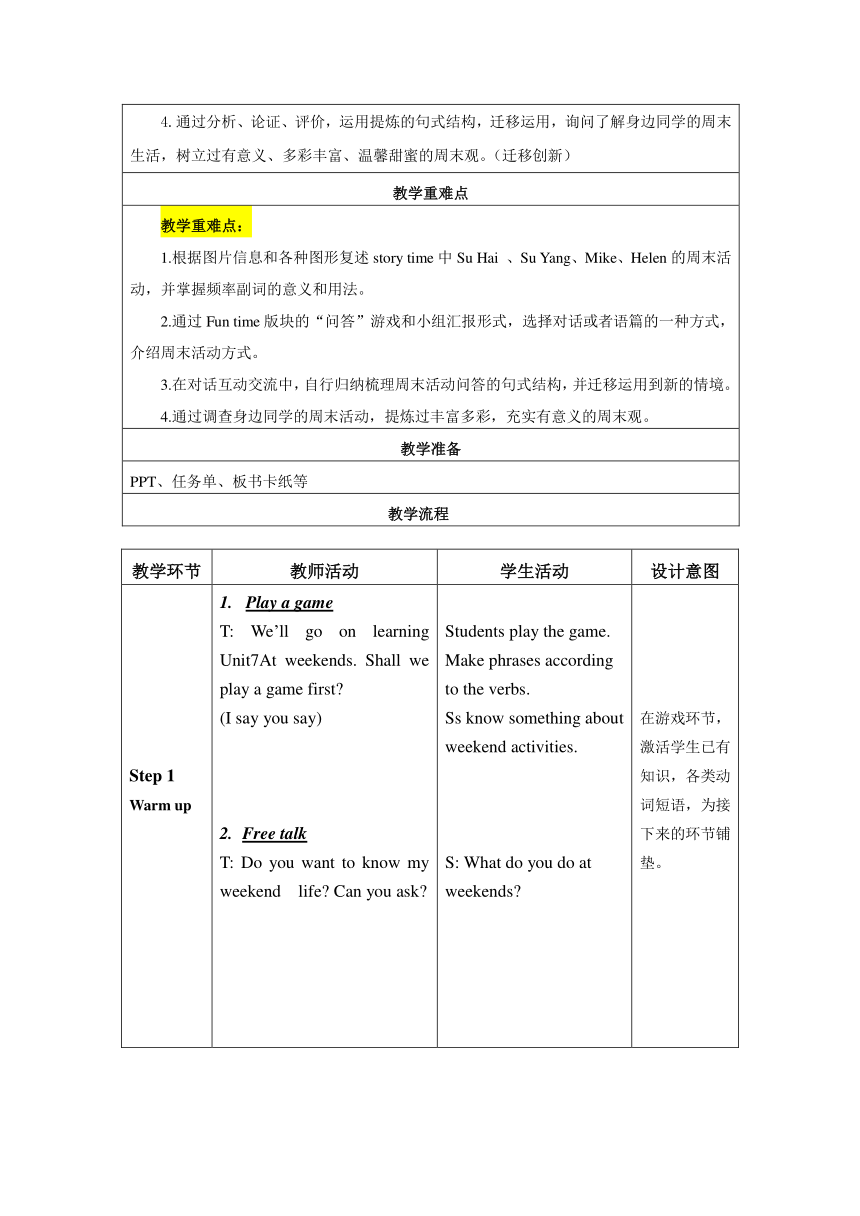Unit7 At weekends 表格式教案
文档属性
| 名称 | Unit7 At weekends 表格式教案 |

|
|
| 格式 | docx | ||
| 文件大小 | 71.5KB | ||
| 资源类型 | 教案 | ||
| 版本资源 | 牛津译林版 | ||
| 科目 | 英语 | ||
| 更新时间 | 2024-06-28 11:16:01 | ||
图片预览



文档简介
课题 五上 Unit7 At weekends
教学内容 Grammar time & Fun time 执教
教学背景分析
一、单元内容分析 1. 教材板块 板块教学内容Story time通过Mike和Su Hai之间的对话了解彼此以及Helen的周末活动。Grammar time 以特殊疑问句的形式对周末活动进行问答,学习频率副词的用法,并进一步巩固一般现在时中动词第三人称单数的变化规则。Fun time游戏、对话形式讨论他人的周末活动Sound time字母s在单词中的读音/z/Culture time学习、了解英美国家和中国受欢迎的体育运动Cartoon timeBobby和Sam邀请Billy参加周末活动的小故事Checkout time完成周末活动的调查报告,说一说,并能完成一段话Ticking time学习评价
2. 单元解读 (1)主题语境:人与自我、人与社会 (2)主题意义:了解自己及他人的周末活动,学会表达不同的周末活动内容,并合理安排自己的周末活动,体验丰富多彩的周末活动带来的乐趣。在平时要培养一些兴趣爱好,积极参加各种活动,认识更多的朋友,使周末活动更加丰富多彩,使学生对生活保持热爱、充满期待!(3)主题体系:认识不同的周末活动—询问他人的周末活动—了解更多的周末活动—分享自己及朋友的周末活动 (4)功能意念:社会交往/介绍、谈论活动;情感/成就感、价值感、幸福感 (5)语篇类型:通过介绍、对话、游戏、问卷调查等多种形式,从了解如何介绍、谈论自己及他人的周末活动方面的话题,到自己可以通过听、说、写等形式来思辨、介绍和分享彼此的周末活动。 (6)语言技能:整个单元将“听、说、读、看、写”贯穿其中,每个板块都侧重某一语言技能,或几项技能相互融合,使学生认识并学会运用语言来表达自己及他人的周末活动。 (7)语言知识:周末活动的短语;用“What do/does...do at weekends ”“I/They/He/She always/usually/often/sometimes...”询问或介绍某人的周末活动;频率副词always,usually,often和sometimes的用法;字母s在单词中的发音。 (8)文化知识/价值引领:通过本单元的话题“周末活动”让学生能够表达不同的活动,从而让他们明白要合理地安排自己的周末活动,过有意义的周末,并以此来提高自我的价值感、成就感和幸福感! 二、学情分析 五年级的学生活泼好动、善于思考、勇于挑战,已经形成一定的自主学习意识,在已有的语言知识和技能的基础上可以简单地表达自己的想法和意愿,学习积极性和主动性也逐渐增强。 已有基础(what they know):相关话题:本单元的话题是周末活动,学生已经具有日常活动和业余爱好方面的词汇积累,并能够用恰当的语言I like…进行表述;在译林版小学英语教材四上Unit4、四下Unit2、Unit3以及五上Unit4中还有体育运动类、日常活动类以及兴趣爱好类词汇的渗透,在这样的语言知识铺垫下,依托教材、创设丰富的活动,让学生学会准确地介绍自己和他人的周末活动,并从中体验到丰富多彩的周末活动给人们带来的乐趣。通过本单元的学习,学生能更好地理解周末活动与兴趣爱好之间的联系(Unit4Hobbies),也能对自己的周末生活做更好的安排。相关语法知识,五上Unit3至Unit6都涉及到动词三单形式教学,学生对动词三单使用的情境理解和运用难度不是很大。 学习期待(what they want to know):作为第二课时的语法教学版块,要立足教材,对story time内容进行复习与巩固;还要用足教材,围绕story time中四位主人公的周末活动,总结提炼句式结构;在grammar time中熟练掌握频率副词意义和用法,周末活动的句式问答及动词三单运用;在fun time 板块实践应用;联系生活实际,在调查同学周末活中迁移创新,提炼主题意义。
教学目标
第二课时:Grammar time & Fun time 通过本课学习,学生能够: 1.通过感知与注意,拓展频率副词的维度,梳理其意义与用法,借助可视化图形呈现结构化知识。(学习理解) 2.通过获取、概括与整合,自行归纳周末活动问答句式结构,总结提炼第三人称单数动词变化规则。(学习理解) 3.基于结构图,通过分析与判断,在fun time板块,通过两人问答、四人小组活动,实践内化周末活动问答句式,促进学中用、用中学、学以致用。(拓展实践) 4.通过分析、论证、评价,运用提炼的句式结构,迁移运用,询问了解身边同学的周末生活,树立过有意义、多彩丰富、温馨甜蜜的周末观。(迁移创新)
教学重难点
教学重难点: 1.根据图片信息和各种图形复述story time中Su Hai 、Su Yang、Mike、Helen的周末活动,并掌握频率副词的意义和用法。 2.通过Fun time版块的“问答”游戏和小组汇报形式,选择对话或者语篇的一种方式,介绍周末活动方式。 3.在对话互动交流中,自行归纳梳理周末活动问答的句式结构,并迁移运用到新的情境。 4.通过调查身边同学的周末活动,提炼过丰富多彩,充实有意义的周末观。
教学准备
PPT、任务单、板书卡纸等
教学流程
教学环节 教师活动 学生活动 设计意图
Step 1 Warm up Play a game T: We’ll go on learning Unit7At weekends. Shall we play a game first (I say you say) Free talk T: Do you want to know my weekend life Can you ask Students play the game. Make phrases according to the verbs. Ss know something about weekend activities. S: What do you do at weekends 在游戏环节,激活学生已有知识,各类动词短语,为接下来的环节铺垫。
Step2 Revision & Presentation My weekend activities T: Look, this is my weekend timetable What do you know from it T: What can you find from the chart Summary 1: Mike and his friends’ weekend activities T: Tom and Lily want to do a survey about weekend activities. Whose weekends are they talking T: Can you ask about their weekends T: Look at the bar chart. It can help you know frequency clearly. T: Do you have any questions about Mike’s weekends T: How to ask about Helen’s weekends T: You know their activities from the story time. Work in pairs and help them finish the survey. T: What can you find from the sentences on the blackboard Summary 2: T: Why should we use “goes、does”? T: From Unit3, we have… T: Why should we use “plays、goes “here? Summary 3: Jim and Amy’s weekend activities T: Tom and Lily are doing a survey about Jim and Amy’s weekend activities. Let’s join the game. Who wants to play the game first T:I throw the dice, I ask and you answer, please. T: What does she do T: You can ask and I will answer. T: He plays football. T: It’s your turn. Ask and answer in turns. Have fun! T:From the game, what are Amy and Mike’s weekend activities T: But how often does Amy watch TV T: Do you want to challenge in a group work Have a try to finish the task. Way 1: Ask and answer☆ Way2: Talk in a passage☆☆ S1: I know you always read books. S2: I know you usually play basketball. S3: I know you often watch TV and sometimes cook food. Ss try to conclude the rules. S1: Su Hai and Su Yang’s. S1: What do they do at weekends S2: Su Hai and Su Yang usually... They... Kitty. They often... S1: What does he do at weekends S2: What does she do at weekends S1: Mike usually…He sometimes... S2: Helen… Ss try to conclude the rules. Ss:The third person singular. Ss try to conclude the rules. S1: I want to play. S1:She reads books. S2: What does he do Ss play the game . Ss find out the weekend activities. S1:She usually watches TV S2:She sometimes studies on the Internet. Ss work together to finish the task and report by one way. 通过观察教师的周末行事历,引导学生分析比较,总结归纳频率副词的意义和用法。(达成目标1) 通过复习课文内容,提炼周末活动问答关键句,让学生掌握问答句式结构,也为最后环节的输出打下结实的基础。(达成目标2) 学生通过实践、迁移等学习方式,自行归纳动词三单形式变化规律。(达成目标2) 通过游戏的方式,围绕Amy和Mike的周末活动,巩固文本中涉及信息内容,自行选择汇报,分级评价,在小组活动中发展读、看、说、做语言技能。 集体交流学习成果,分享学习方法。(达成目标3)
Step3: Consolidation Talk about classmates’ weekend T:What about our classmates’ weekend activities T: Now you can do a survey and share with us. T: Would you like to share with us T: I also did a survey about all of you. T: Some of you ...These are about... T: Apart of you...What are they about T:What do you think of weekends Finish the task. Ss ask, take notes, summarize and present S: Colourful Meaningful Warm and sweet 小组合作,利用调查表梳理学生的周末活动,并进行汇报分享,过一个有意义的周末。学生真正习得获取、转化、迁移、运用知识的能力,真正达成学以致用。(达成目标4)
Step4 Homework 1. Must-do: To use the chart to do ask and answer with your friends and write down your weekend activities. 2.Optional: To get to know your family’s weekend activities, and try to take photos or make a V-log 1.表达与书写:在运用中巩固、迁移周末活动不同人称的表达。 2.调查与创新:在调查家人周末时,总结优化家庭周末生活安排。
板书 设计 Unit 7At weekends What do you do at weekends I always read books. What do they do at weekends They often have dinner with grandparents. What does he/she do at weekends He usually plays football. She sometimes goes to the cinema.
教学内容 Grammar time & Fun time 执教
教学背景分析
一、单元内容分析 1. 教材板块 板块教学内容Story time通过Mike和Su Hai之间的对话了解彼此以及Helen的周末活动。Grammar time 以特殊疑问句的形式对周末活动进行问答,学习频率副词的用法,并进一步巩固一般现在时中动词第三人称单数的变化规则。Fun time游戏、对话形式讨论他人的周末活动Sound time字母s在单词中的读音/z/Culture time学习、了解英美国家和中国受欢迎的体育运动Cartoon timeBobby和Sam邀请Billy参加周末活动的小故事Checkout time完成周末活动的调查报告,说一说,并能完成一段话Ticking time学习评价
2. 单元解读 (1)主题语境:人与自我、人与社会 (2)主题意义:了解自己及他人的周末活动,学会表达不同的周末活动内容,并合理安排自己的周末活动,体验丰富多彩的周末活动带来的乐趣。在平时要培养一些兴趣爱好,积极参加各种活动,认识更多的朋友,使周末活动更加丰富多彩,使学生对生活保持热爱、充满期待!(3)主题体系:认识不同的周末活动—询问他人的周末活动—了解更多的周末活动—分享自己及朋友的周末活动 (4)功能意念:社会交往/介绍、谈论活动;情感/成就感、价值感、幸福感 (5)语篇类型:通过介绍、对话、游戏、问卷调查等多种形式,从了解如何介绍、谈论自己及他人的周末活动方面的话题,到自己可以通过听、说、写等形式来思辨、介绍和分享彼此的周末活动。 (6)语言技能:整个单元将“听、说、读、看、写”贯穿其中,每个板块都侧重某一语言技能,或几项技能相互融合,使学生认识并学会运用语言来表达自己及他人的周末活动。 (7)语言知识:周末活动的短语;用“What do/does...do at weekends ”“I/They/He/She always/usually/often/sometimes...”询问或介绍某人的周末活动;频率副词always,usually,often和sometimes的用法;字母s在单词中的发音。 (8)文化知识/价值引领:通过本单元的话题“周末活动”让学生能够表达不同的活动,从而让他们明白要合理地安排自己的周末活动,过有意义的周末,并以此来提高自我的价值感、成就感和幸福感! 二、学情分析 五年级的学生活泼好动、善于思考、勇于挑战,已经形成一定的自主学习意识,在已有的语言知识和技能的基础上可以简单地表达自己的想法和意愿,学习积极性和主动性也逐渐增强。 已有基础(what they know):相关话题:本单元的话题是周末活动,学生已经具有日常活动和业余爱好方面的词汇积累,并能够用恰当的语言I like…进行表述;在译林版小学英语教材四上Unit4、四下Unit2、Unit3以及五上Unit4中还有体育运动类、日常活动类以及兴趣爱好类词汇的渗透,在这样的语言知识铺垫下,依托教材、创设丰富的活动,让学生学会准确地介绍自己和他人的周末活动,并从中体验到丰富多彩的周末活动给人们带来的乐趣。通过本单元的学习,学生能更好地理解周末活动与兴趣爱好之间的联系(Unit4Hobbies),也能对自己的周末生活做更好的安排。相关语法知识,五上Unit3至Unit6都涉及到动词三单形式教学,学生对动词三单使用的情境理解和运用难度不是很大。 学习期待(what they want to know):作为第二课时的语法教学版块,要立足教材,对story time内容进行复习与巩固;还要用足教材,围绕story time中四位主人公的周末活动,总结提炼句式结构;在grammar time中熟练掌握频率副词意义和用法,周末活动的句式问答及动词三单运用;在fun time 板块实践应用;联系生活实际,在调查同学周末活中迁移创新,提炼主题意义。
教学目标
第二课时:Grammar time & Fun time 通过本课学习,学生能够: 1.通过感知与注意,拓展频率副词的维度,梳理其意义与用法,借助可视化图形呈现结构化知识。(学习理解) 2.通过获取、概括与整合,自行归纳周末活动问答句式结构,总结提炼第三人称单数动词变化规则。(学习理解) 3.基于结构图,通过分析与判断,在fun time板块,通过两人问答、四人小组活动,实践内化周末活动问答句式,促进学中用、用中学、学以致用。(拓展实践) 4.通过分析、论证、评价,运用提炼的句式结构,迁移运用,询问了解身边同学的周末生活,树立过有意义、多彩丰富、温馨甜蜜的周末观。(迁移创新)
教学重难点
教学重难点: 1.根据图片信息和各种图形复述story time中Su Hai 、Su Yang、Mike、Helen的周末活动,并掌握频率副词的意义和用法。 2.通过Fun time版块的“问答”游戏和小组汇报形式,选择对话或者语篇的一种方式,介绍周末活动方式。 3.在对话互动交流中,自行归纳梳理周末活动问答的句式结构,并迁移运用到新的情境。 4.通过调查身边同学的周末活动,提炼过丰富多彩,充实有意义的周末观。
教学准备
PPT、任务单、板书卡纸等
教学流程
教学环节 教师活动 学生活动 设计意图
Step 1 Warm up Play a game T: We’ll go on learning Unit7At weekends. Shall we play a game first (I say you say) Free talk T: Do you want to know my weekend life Can you ask Students play the game. Make phrases according to the verbs. Ss know something about weekend activities. S: What do you do at weekends 在游戏环节,激活学生已有知识,各类动词短语,为接下来的环节铺垫。
Step2 Revision & Presentation My weekend activities T: Look, this is my weekend timetable What do you know from it T: What can you find from the chart Summary 1: Mike and his friends’ weekend activities T: Tom and Lily want to do a survey about weekend activities. Whose weekends are they talking T: Can you ask about their weekends T: Look at the bar chart. It can help you know frequency clearly. T: Do you have any questions about Mike’s weekends T: How to ask about Helen’s weekends T: You know their activities from the story time. Work in pairs and help them finish the survey. T: What can you find from the sentences on the blackboard Summary 2: T: Why should we use “goes、does”? T: From Unit3, we have… T: Why should we use “plays、goes “here? Summary 3: Jim and Amy’s weekend activities T: Tom and Lily are doing a survey about Jim and Amy’s weekend activities. Let’s join the game. Who wants to play the game first T:I throw the dice, I ask and you answer, please. T: What does she do T: You can ask and I will answer. T: He plays football. T: It’s your turn. Ask and answer in turns. Have fun! T:From the game, what are Amy and Mike’s weekend activities T: But how often does Amy watch TV T: Do you want to challenge in a group work Have a try to finish the task. Way 1: Ask and answer☆ Way2: Talk in a passage☆☆ S1: I know you always read books. S2: I know you usually play basketball. S3: I know you often watch TV and sometimes cook food. Ss try to conclude the rules. S1: Su Hai and Su Yang’s. S1: What do they do at weekends S2: Su Hai and Su Yang usually... They... Kitty. They often... S1: What does he do at weekends S2: What does she do at weekends S1: Mike usually…He sometimes... S2: Helen… Ss try to conclude the rules. Ss:The third person singular. Ss try to conclude the rules. S1: I want to play. S1:She reads books. S2: What does he do Ss play the game . Ss find out the weekend activities. S1:She usually watches TV S2:She sometimes studies on the Internet. Ss work together to finish the task and report by one way. 通过观察教师的周末行事历,引导学生分析比较,总结归纳频率副词的意义和用法。(达成目标1) 通过复习课文内容,提炼周末活动问答关键句,让学生掌握问答句式结构,也为最后环节的输出打下结实的基础。(达成目标2) 学生通过实践、迁移等学习方式,自行归纳动词三单形式变化规律。(达成目标2) 通过游戏的方式,围绕Amy和Mike的周末活动,巩固文本中涉及信息内容,自行选择汇报,分级评价,在小组活动中发展读、看、说、做语言技能。 集体交流学习成果,分享学习方法。(达成目标3)
Step3: Consolidation Talk about classmates’ weekend T:What about our classmates’ weekend activities T: Now you can do a survey and share with us. T: Would you like to share with us T: I also did a survey about all of you. T: Some of you ...These are about... T: Apart of you...What are they about T:What do you think of weekends Finish the task. Ss ask, take notes, summarize and present S: Colourful Meaningful Warm and sweet 小组合作,利用调查表梳理学生的周末活动,并进行汇报分享,过一个有意义的周末。学生真正习得获取、转化、迁移、运用知识的能力,真正达成学以致用。(达成目标4)
Step4 Homework 1. Must-do: To use the chart to do ask and answer with your friends and write down your weekend activities. 2.Optional: To get to know your family’s weekend activities, and try to take photos or make a V-log 1.表达与书写:在运用中巩固、迁移周末活动不同人称的表达。 2.调查与创新:在调查家人周末时,总结优化家庭周末生活安排。
板书 设计 Unit 7At weekends What do you do at weekends I always read books. What do they do at weekends They often have dinner with grandparents. What does he/she do at weekends He usually plays football. She sometimes goes to the cinema.
